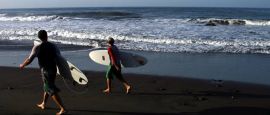El Salvador Health Care and Vaccinations
| Title | Special precautions |
|---|---|
| Diphtheria |
Sometimes |
| Hepatitis A |
Yes |
| Malaria |
Sometimes |
| Rabies |
Sometimes** |
| Tetanus |
Yes |
| Typhoid |
Yes |
| Yellow Fever |
No* |
Travellers to El Salvador should arrange to see their doctor around two months prior to travel, in order to discuss their specific vaccination needs. All nationals older than six months wishing to enter El Salvador from Europe are required to produce a certificate of vaccination against measles and rubella (German measles). Travellers from non-European countries are advised to take the same precaution, which is designed to reduce the chance of the re-introduction of these diseases into countries where they have been eradicated. A Hepatitis B vaccine is recommended for all infants and for children aged 11 to 12 years who did not receive the vaccine in infancy.
Within El Salvador, the provision of medical services varies enormously. Outside of San Salvador, medical facilities are limited. In the capital, doctors are well trained but hospitals may lack state-of-the art facilities. Doctors and hospitals expect immediate cash payment. Credit cards are accepted by most hospitals, but not necessarily by all doctors. Travellers are advised to take out adequate medical insurance – of at least £2m and covering the cost of repatriation as well as treatment.
At all times, travellers should carry a copy of their insurance documents and passport, since hospitals may not provide treatment otherwise. State-run hospitals are basic and visitors are advised to use private clinics where possible. Some medical providers may have at least a basic command of English, but a Spanish phrase book covering language for emergency situations is recommended. The phone number for the emergency services is 911.
Water used for drinking, brushing teeth or making ice should have first been boiled or otherwise sterilised. Avoid dairy products that are likely to have been made from unboiled milk. Only eat well-cooked meat and fish. Vegetables should be cooked and fruit peeled.
Dengue fever is reported to be on the increase. Vaccinations for tuberculosis and hepatitis B are sometimes recommended. Dangerous currents on El Salvador’s beaches have claimed several lives in recent years, and many beaches do not have adequate lifeguard coverage or warning signage. Always exercise caution, take local advice on swimming safety and avoid deserted beaches. The currents around La Bocana de San Diego are known to be unsafe.
Road traffic accidents are a common cause of injury among travellers. Avoid drink-driving, driving in torrential rain or driving at night on poorly-lit roads with which you are not familiar. There is always a danger of whiplash injury, or worse, on overcrowded buses. If travelling by bike or motorcycle, wear a helmet, and take care when crossing all roads.
Do you have any Feedback about this page?
© 2026 Columbus Travel Media Ltd. All rights reserved. No part of this site may be reproduced without our written permission, click here for information on Columbus Content Solutions.








 You know where
You know where